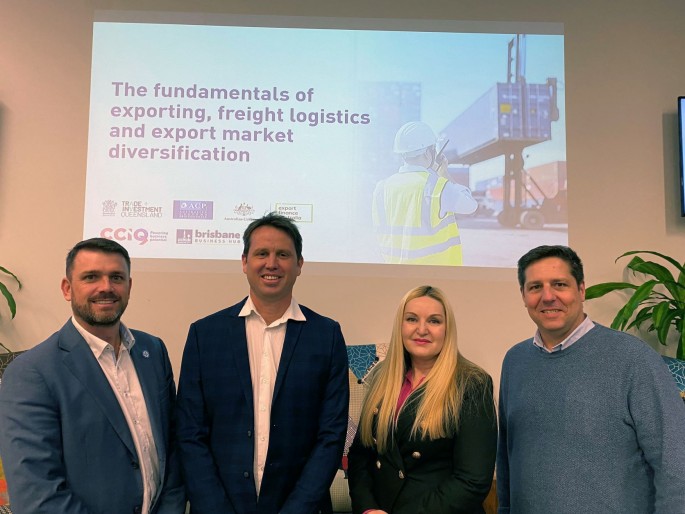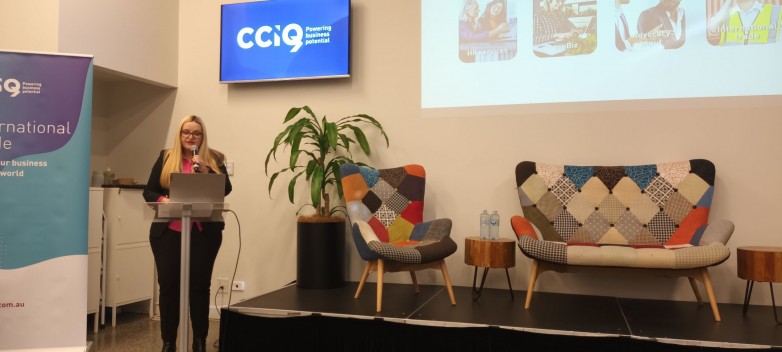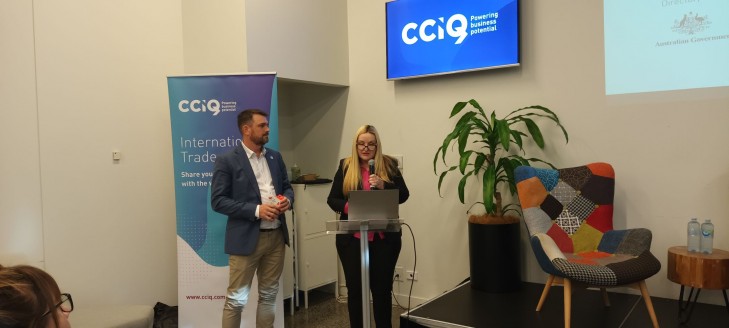The fundamentals of exporting, freight logistics and export market diversification
Published on 30 June 2022
CCIQ invited industry experts to share their insights on export markets diversification and supply chain logistical challenges, both key priorities for Australian exporters over the last two years, while providing an overview on how to become a successful exporter.
The event was held at the Brisbane Business Hub and the key presenters as per below:
- Diana Gueorguieva, International Trade and Strategic Relationships Manager at CCIQ. Diana has over 20 years of experience in international trade and business development. Her key interests are Free Trade Agreements (FTAs) Australia has in place with other countries.
- Adam Pearce, Director Business Development at Export Finance Australia. Adam has 21 years of business banking and corporate banking experience. At Export Finance Australia he is responsible for delivering financial solutions to Queensland based export businesses.
- Reginald Roberts, Southern Regional Network Manager at Trade and Investment Queensland. With over 20 years of experience in the recreation industry throughout Australia and the USA Reginald is a highly experienced, credentialed, respected leader, and a project manager program coordinator.
- Trent Barratt, Managing Director at Australian Customs Professionals. Trent is an International Freight Forwarder and Customs Broker with more than 28 years of experience in International Trade. He has gained extensive experience with a large German Freight forwarder attending exclusive management schools in Europe.
Read highlights from the event and get their expert tips below.

How to become a successful exporter?
Entering the overseas market provides great opportunity to make additional profits and expand customer network. It helps develop the business growth and improve ROI. Successful exporting is a journey that requires taking one step at a time. Follow the 7-step process below to successful exporting.
CCIQ’s International team can assist your business every step on the way, contact them on (07) 3192 0150.
Step 1: Product & company export capability assessment
The first step is to assess your product and company’s export capability by performing current market research and identifying key purchase trends within your target market. Ensure that your company has sufficient funds required to export overseas.
You must clearly identify your strengths to export successfully. Address your weaknesses too, such as how adaptable you are and whether your company strengths are transferable to service overseas markets?
Some businesses may find it challenging to assess their own business when considering exporting. Consider involving experienced international trade consultant to discover areas requiring your attention.
Step 2: Organising for exports and identifying opportunities
Once you are ready, the next step is to start an extensive preliminary desk research. Understanding the relevant laws and regulations of the country that you are exporting to, and the current economic and political climate will help you to identify any potential issues that may affect your exporting capabilities.
While investigating, make sure you only get information from reliable sources. Verify the data with careful cross-referencing and look for major trends. Additional information that must be gathered include:
- Certificate of Origin requirements
- Export logistics
- Import licenses and quotas
- Labelling and packaging
- Tariff and non-tariff barriers to trade
Market evaluation and selection is critical in helping you identify key trends throughout previous years and assists you with matching your business strengths to each market.
Step 3: Market entry strategy options evaluation
The next step is determining the appropriate market entry strategy that will best help to achieve and maintain price competitiveness. There are many factors to consider here like the level of required control over goods, physical distribution capabilities of potential distributors, after-sales service, available funds and other barriers .
Some of the possible market entry strategies options are:
- Agent: the agent handles the sales orders, usually works on fixed commission and will not take possession of title to goods (i.e. does not own the goods or distribute the goods)
- Distributor: this is a preferred option for many exporters that desire a representative to accept sole marketing responsibility, including taking ownership of the goods. Finding the right distributor can be critical to business, it is important to get it right from the beginning to overcome the entry barriers especially where local knowledge and connections are necessary.
- Joint venture: to develop greater control over sales some manufacturers set up foreign subsidiaries or joint venture operations with a local partner.
- Licensing: a grant of permission for a payment of royalty or fee e.g. patent, trademark
- Franchising: a sophisticated form or licensing where a franchisor has considerable control.
Step 4: Marketing & planning considerations
The next step to successfully export is marketing and planning your operation. Research your target market and develop your export strategy, export plan and expected export sales forecasting. Ensure that you have created an adequate product, pricing, and distribution strategies.
Create your marketing & communications strategies as well as a financial management plan. Draw an export plan including:
- An executive summary
- Objectives and goals
- An action plan
- Sales forecast
- Marketing budget
- Performance control
The export plan is separate from the business plan – it is an extension of the business plan.
Step 5: Regulatory & legal aspects to consider
When exporting a product or service overseas you will be faced with several regulatory and legal requirements. Next step to successful exporting is addressing these requirements. Legal agreements including ‘contract of sale’, ‘distributorship’ or ‘agency agreement’.
It is essential that you seek professional legal advice to get things right from the start.
Regulatory requirements for exporting include export licenses, import quotas, import licenses, custom controls and more. Intellectual Property protection – patents and trademark registrations are also required.
Step 6: Financing your exports and getting paid
Having a financial risk management plan, adequate insurance, and payment procedures are crucial to the successful exporting process. Export Finance Australia can assist your business.
Payment options may include cash payment and a Letter of Credit (L/C). Speak to your bank to help you determine the best payment option and to draft your L/C (if this is the preferred option).
Ensure that you have a currency forward exchange contract to minimise any risks when dealing with multiple currencies overseas.
Step 7: Export logistics and export documentation
Finally, ensure all relevant processes are followed, and that your business has obtained the correct export documentation.
Develop some understanding of the process and costs involved. Discuss your export documentation needs with an experienced freight forwarder.
Seek assistance and discuss your Certificate or Origin and ATA carnet requirements with CCIQ. Our experts can assist with ensuring that your business has the required export documentation prior to entering the overseas market.

What are the common mistakes while considering exporting?
Thoroughly researching your target market, creating an export marketing plan and sound export strategy will help to avoid any common issues that may arise. The most recuring mistakes include cultural boundaries, misunderstanding of local regulations, distribution problems and identifying incorrect target markets.
Mistakes can vastly affect the success of the product or service that you are exporting.
If not sure - just ask!
Expert guidance and consultation can reduce the risk of failing in the overseas market and save your business money.
CCIQ can minimise the stress associated with export documentation compliance, we also have an established process in place with the Department of Foreign Affairs and Trade to resolve any issues at customs.
Contact the team on 07 3192 0150 or email on [email protected]
What export support and resources are available?
There are many resources available to find helpful information, advice and support when looking to export your product or service overseas. Asking for assistance from reliable sources allows you to further understand the requirements involved with exporting and ensures that your business is in the best possible position prior to entering the overseas market.
|
All major banks |
|
|
Lawyers/Accountants – International focus |
|
|
Freight Forwarders, shipping lines and industry associations |
|
|
International Chambers of Commerce
|
How can CCIQ help your business?
CCIQ is part of the export supply chain and plays a significant role in the exporting industry.
CCIQ has been issuing non-preferential Certificates of Origin (COOs) since 1923! We have been authorized under various international conventions to do so.
CCIQ is a JAS-ANZ Accredited authority to issue preferential Error! Hyperlink reference not valid. required for tariff concessions at destination for certain goods, qualifying under various Australian Free Trade Agreements: AANZFTA, TAFTA, KAFTA, ChAFTA, JAEPA, CPTPP, IA-CEPA, Australia-Chile FTA, PAFTA, RCEP.
Available options:
- electronically submitted via essCert or CertConnect, or
- submitted via [email protected] for manual certification.
CCIQ is the issuing authority for Queensland for ATA Carnets - applicable for 87 countries to avoid payment of customs duties and taxes on your temporary exports.
CCIQ can also assist with: Certificate of Free Sale, Visa Certification letter for Saudi Arabia, and any other documents requested to be certified by the Chamber of Commerce.
In addition to specific export documentation, CCIQ can assist with Australian FTAs education and compliance; export education, international trade events, webinars, seminars and specific market research and export strategy projects.
The Export Hotline is a member-only service connecting CCIQ members with International Trade Advisors. Our advisors have over 60 years of experience and can provide trusted market intelligence, practical advice and business tools to help your business expand across global markets.
CCIQ is a Regional Certifying Body (RCB) for seven Queensland locations assisting regional businesses with their skills shortages to be able to sponsor skilled workers on the Skilled Employer Sponsored Regional (SESR) visa (subclass 494).
Become a member to avail discounts on export documentation and RCB advice. Get over the phone assistance when you need it most and increase your chances of overseas success.
How Covid Impacted the Freight industry – an overview
A massive reduction in flights was recorded just after the COVID outbreak. From 15,000 flights on 7 March 2020 to only 5000 flights a month later. That’s where ships and vessels came in high demand and lead to a lack of capacity, port congestion, shortage of containers, overbooking vessels, staff shortage etc. Prices for US freight went up 80% and have tripled since.
The past 2 years have been overwhelming for businesses; but things are improving at a fast pace. A tremendous number of vessels and aircrafts are being manufactured. A lot of container orders are being placed.
How to identify and cover risks while exporting?
The recent Suez Canal obstruction event is an example of modern challenges, risks and how to minimise those. The Ever Given vessel was detained by the Egyptian government until the Japanese owners could settle a US $990 million claim for the damage done to the canal, loss of income and vessel recovery.
This was settled by General Average which means that anyone on board, regardless of their cargo value, paid a percentage of loss. So, a business exporting a Lamborghini would have potentially paid a similar amount to what a business exporting t-shirts.
This case is a reminder of how essential it is to look at the insurance policies before getting into a trade, the necessity of reading the terms and conditions and looking at the Free Trade Agreements to save your business money.
How to mitigate the risk while exporting?
- Understanding Incoterms rules can provide specific guidance to exporters and help reduce risk.
- Researching the overseas market thoroughly and understanding policies and Free Trade Agreements can help reduce costs.
- Read the terms and conditions that you agreed to and understand what’s included or excluded.
- Getting insured will save you from unforeseen circumstances such as vessel being stuck or delays.
- Be adaptive and control your freight, secure your supply lines and quickly adapt to market conditions.

How can Export Finance Australia help businesses?
Export Finance Australia is an Australian Government’s export credit agency. They operate on a commercial basis and can provide finance solutions to businesses looking to expand overseas. Their team is supported by banks, advisors, brokers, and accountants to provide complementary finance solutions to businesses and ensuring them success.
Finance solutions provided by Export Finance Australia are:
- Loans to Australian businesses and overseas buyers of Australian goods and services (including governments)
- Bonds to help Australian businesses with their security obligations under overseas contracts.
- They work with banks to provide guarantees where they otherwise couldn’t provide finance.
- They have recently granted equity powers enabling them to better support overseas infrastructure development and export-linked Australian businesses in sectors of economic significance.
Am I eligible to get help from Export Finance Australia?
If you are a direct exporter, or an export supply chain business supplying mining service, Agri services or manufacturing with a minimum of 2 years of trading history, plus, have a minimum turnover of $250K, yes, you are eligible.
Export Finance Australia doesn’t support start-ups.
All sectors, most geographies and businesses of all sizes are eligible.
Export Finance Australia has funded and supported businesses like Nomad Design Tackle, Active Apparel Group, Venlo Investments and many more.
What can I learn from past exporters?
Experience gives valuable insights. Here are some items to consider while drawing up an export plan:
- It always takes longer than expected when dealing with contract negotiations and documentation. Plan for longer time frames.
- It always costs more than the actual budget. This may be because of additional legal fees, requirement of additional people involvement, currency movements etc.
- Exporting requires strong business planning involving contracts, cash flow, realistic budgets, so plan ahead in case of non-payment and management capability.
- Various uncalled risks like geo-political, environmental, technical, disputes etc. might become a hindrance in your export project.
- It’s important to maintain a strong relationship with financiers by communicating and discussing sufficient limits to fund the business needs and growth.
- List all payment method options beforehand and make sure they are agreeable to all parties.
- Ensure the business plan to overseas market is profitable and making a return on investment.
Export Finance Australia can support Australian export related businesses and strengthen client relationships with buyers and financiers.
How can Trade and Investment Queensland help your business?
Trade and Investment Queensland works with partner agencies, industry organisations and international allies to promote Queensland and work closely with businesses and investors to maximise trade and investment opportunities.
Succeeding globally is rewarding but not without challenges. Trade and Investment Queensland can enable businesses and industries to succeed in overseas markets by helping them prepare and by connecting them with the markets, capital, and talent they need. They can also assist in securing deals and getting the product to market and scaling up.
As part of the economic recovery strategy, TIQ has created grant programs to support opportunities for exporters in diversifying their market.
- New Market Program (NMP): This program helps experienced exporters identify new opportunities in overseas markets. The NMP includes grant funding to support exporters to create new export outcomes and support TIQ’s purpose of driving global business opportunities that create jobs and prosperity across Queensland.
- Go Global Export Program (GGEP): This program helps SMEs with financial support to cover the eligible project costs of finalising a sale into a new international market. TIQ recognises there are export sale barriers that are difficult to overcome when working with a new market.
Eligible costs and activities for New Market Program include:
- Modifying products or services for overseas market and sending free samples across
- Participating in international trade fairs, seminars, forums, and events
- Assistance with developing promotional materials & product demonstrations
- Certification requirements and market-specific compliance
- Traveling to market and engagement of an in-market representative for promotion of products/services.
Eligible costs and activities for Go Global Export Program can support with:
- Costs of product testing, redesign, packaging, and labelling
- Export business advisory documentation & compliance
- Professional advice (accounting, financial or legal) on contract negotiation, counterfeit protection, and IP advice
- Financial support to gain export accreditation such as good manufacturing practice, halal accreditation etc.
- Costs associate with product approvals, installation, training, operations, and maintenance
- Cost of trial export program including product samples, trial shipment with no commercial outcome
Trade and Investment Queensland has helped exporters with financial assistance and supported them identify new opportunities in markets. Get in touch with TIQ and take advantage of the offered
programs.

Key takeaways
- Extensive market research, planning and 100% management commitment to export are essential for the success of your export venture
- Use reliable information sources such as Trade & Investment Queensland (TIQ), the Australian Trade and Investment Commission (Austrade), Export Finance Australia, the Chamber of Commerce & Industry Queensland (CCIQ) and other government and non-government entities when considering expanding your business to another overseas market/s
- Do not try to sell on your first visit to the export market! Remember that your visit is for exploratory purposes and building key relationships in the export market of interest.
- Sufficient funds are required for your business to expand into overseas market. Speak to Export Finance Australia, Trade and Investment Queensland, Austrade for available funding.
- Get your export documentation right! Contact CCIQ for ATA Carnet to save customs duties and taxes on your temporary exports when taking product samples or/and exhibiting overseas
- Use experienced freight logistics professionals, such as Queensland Customs Brokers, to help you overcome global supply chain issues.
Get in touch with CCIQ International team of experts on 07 3192 0150 or [email protected]







